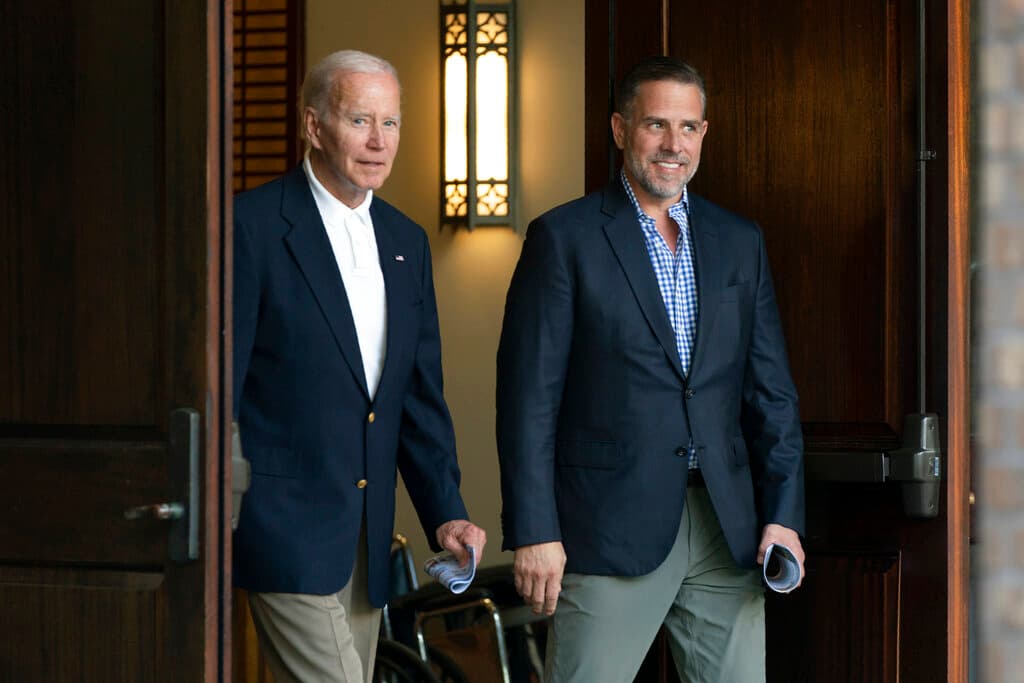A Coverup in the Making in Federal Court in Delaware
The special prosecutor in the Hunter Biden case wants to move it out of the courtroom of the judge who sank the sweetheart deal.

Is Judge Maryellen Noreika going to allow the lawyers to maneuver the Hunter Biden case from under her jurisdiction? She, after all, singlehandedly derailed the so-called “sweetheart deal” between President Biden’s Justice Department and his son Hunter. Now the architect of that deal is the newly-named special counsel in the dispute and has promptly asked her to dismiss some of the charges — supposedly so that he can refile them at Los Angeles or Washington.
Count us as skeptical. As these columns noted on Friday, it’s not clear how broad “a remit has been given” to Mr. Weiss “in respect of the Bidens’ corruption.” The New York Post put its story in the wood, with the headline “COVER-UP GOP Cries Whitewash as AG Appoints Hunter Biden Special Counsel — who ALREADY Botched Case.” Why wasn’t a new prosecutor named, or a special counsel from outside the government?
What we took as a bottom line from the appointment of Mr. Weiss as special counsel is that it would now “be up to Judge Maryellen Noreika to play the part played in Watergate by The Honorable John J. ‘Maximum John’ Sirica.” Now gone, alas, Sirica was the judge who forced the facts to the surface in the Watergate scandal. The way Judge Noreika refused to accept the sweetheart deal makes us think that she could be as tough as Sirica.
Certainly a Sirica-like scrutiny is warranted. Hunter Biden’s deal-making, especially during his father’s tenure as vice president, raises questions that could evolve to the level of impeachment. The case, as we’ve reported, involves large sums — more than $20 million, the House Oversight Committee says — that have reportedly been paid to the Bidens “from foreign entities in Russia, Communist China, Ukraine, Kazakhstan, and Romania.”
Yet under the plea deal put before Judge Noreika, Hunter Biden would have been given broad immunity despite the questions over these business deals, including whether he had complied with federal laws relating to lobbying for overseas concerns. “There are references to foreign companies, for example, in the facts section,” Judge Noreika said in court, asking if America could “bring a charge under the Foreign Agents Registration Act.”
Prosecutors said they could, prompting Hunter Biden’s lawyers to disagree and unraveling the elaborate scheme to keep the president’s son out of prison. Mr. Weiss says it appears the plea deal is a dead letter, and “the Government now believes that the case will not resolve short of a trial,” as he wrote to Judge Noreika on Friday. He asked her to agree to dismiss the tax charges because the “venue for these offenses does not lie in Delaware.”
Well, how did the tax charges get into her court in the first place, if not by the U.S. attorney who is now the special prosecutor? Suddenly Hunter Biden’s lawyers are leaping at the opportunity to leave Judge Noreika’s purview. “Without adopting the Government’s reasoning,” they are claiming, since the “venue” for the case against the president’s son “does not lie in this District, the information must be dismissed.”
Mr. Weiss is cloaking his argument to move the case in constitutional garb, noting that “In criminal cases, proper venue is an important constitutional safeguard” and that the “proper place of colonial trials was so important” to America’s Framers that it’s mentioned “as a grievance in the Declaration of Independence” and “in two separate parts of the Constitution: Article III and the Sixth Amendment.”
So how did the charges get into the federal district court in Delaware? A filing by Mr. Weiss’ office claims that it’s “because the parties had previously agreed that the Defendant,” Hunter Biden, “would waive any challenge to venue and plead guilty in this District.” What Mr. Weiss appears to be doing is shopping for a more credulous judge than Maryellen Noreika. It’s a coverup in the making in broad daylight.

